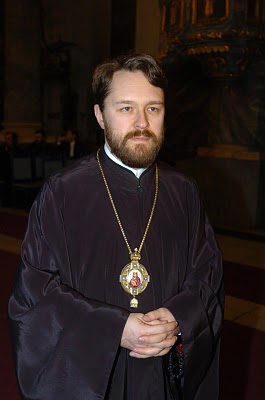
Back on 31 October 2012, Russian Orthodox Metropolitan Hilarion Alfeyev of Volokolamsk
delivered a lecture dedicated to the past and present of Orthodox-Catholic dialogue at Villanova University (Philadelphia, PA). The 46 year old Metropolitan earned a doctorate from Oxford University and was ordained a bishop in 2002. In addition to being a residential bishop he is also the head of the Department of the External Church Relations since 2009. He is a widely published author and an excellent musician of international repute. The two Churches share the same concerns, though there are nuances to be made but that is a conversation for another time.
I think it is apropos to give a few extracts from the Metropolitan's talk that pose some points for reflection on the unity of Christians. Remember we beginning the octave of Christian Unity on the 18th.
"The teaching of the holy fathers of the first millennium, when the Churches of the East and the West abided in unity, although at times this unity was subjected to serious trials, is the sure foundation upon which dialogue between Christians can develop successfully and fruitfully. It is my profound conviction that fidelity to the Christian tradition, the preservation of continuity in the teaching and life of the Church is the proper means for the restoration of unity among Christ's disciples.
"It is because of the renunciation by some Protestant denominations, as well as parts of the Anglican communion, of the ancient Christian tradition that it has become ever more difficult for the Orthodox Church to continue co-operation with them. I regret this, but the dialogues with Protestants and Anglicans which we have had for decades are now under threat because of processes taking place in the Protestant communities of the West and North. I mean the continuing liberalization in the field of theology, ecclesiology and moral teaching. Certain denominations have legitimized the blessing of same-sex unions and the ordination of people openly declaring their non-traditional sexual orientation.
"We are obliged to speak about this because we want to preserve the good that was achieved during the years of dialogue between Orthodox on the one hand and Protestants and Anglicans on the other. In defending the two-thousand-year-old tradition of the Church, we remain true to this dialogue, yet at the same time we see that Protestants and Anglicans are grow- ing away from us by accepting innovations which we find unacceptable.
"I am speaking of this in the walls of a Catholic university by no means because I am afraid to criticize Anglicans and Protestants to their faces. On the contrary, every time the opportunity arises, I speak openly of our concern in direct dialogue with our brothers from the Anglican and Protestant communities. Thus, for example, in 2010 at a festive dinner at the Nicaea Club in London in the presence of the Archbishop of Canterbury Rowan Williams I stated the sad fact that the 'Orthodox and Anglican Churches are to be found on different sides of the abyss which separate Christians of a traditional direction and Christians adhering to liberal teachings'. And as recently as the day before yesterday I spoke of the same things at the old Episcopalian seminary at Nashotah House, a contemporary of your University.
"Unlike dialogue with the Protestants and Anglicans which has reached a dead end, dialogue with the Roman Catholic Church seems to have a future to it precisely because, like the Orthodox Church, the Catholic Church does not think of itself outside of Tradition and strives to teach and live in accordance with the tradition of the apostles and holy fathers. In my view, the significant improvement and strengthening of relations between our Churches that can be seen in recent years is connected to an awareness that we are united by a common heritage, thanks to which both Orthodox and Catholics can and must together bear witness to the world of the eternal values of the Gospel."
In the conclusion of his address Metropolitan Hilarion underscored: "It is essential for the Orthodox and Catholics today to perceive each other not as rivals but as allies in the cause of the defense of Christians' rights. We must develop interaction outside of the success or otherwise of theological dialogue, independent even of how relations between the Orthodox and Catholics take shape in concrete regions around the world. We must build this interaction proceeding from a common strategic task since we are dealing with the future of humanity. It is upon our joint endeavors that the future of Christianity in the third millennium will primarily depend."


Leave a comment